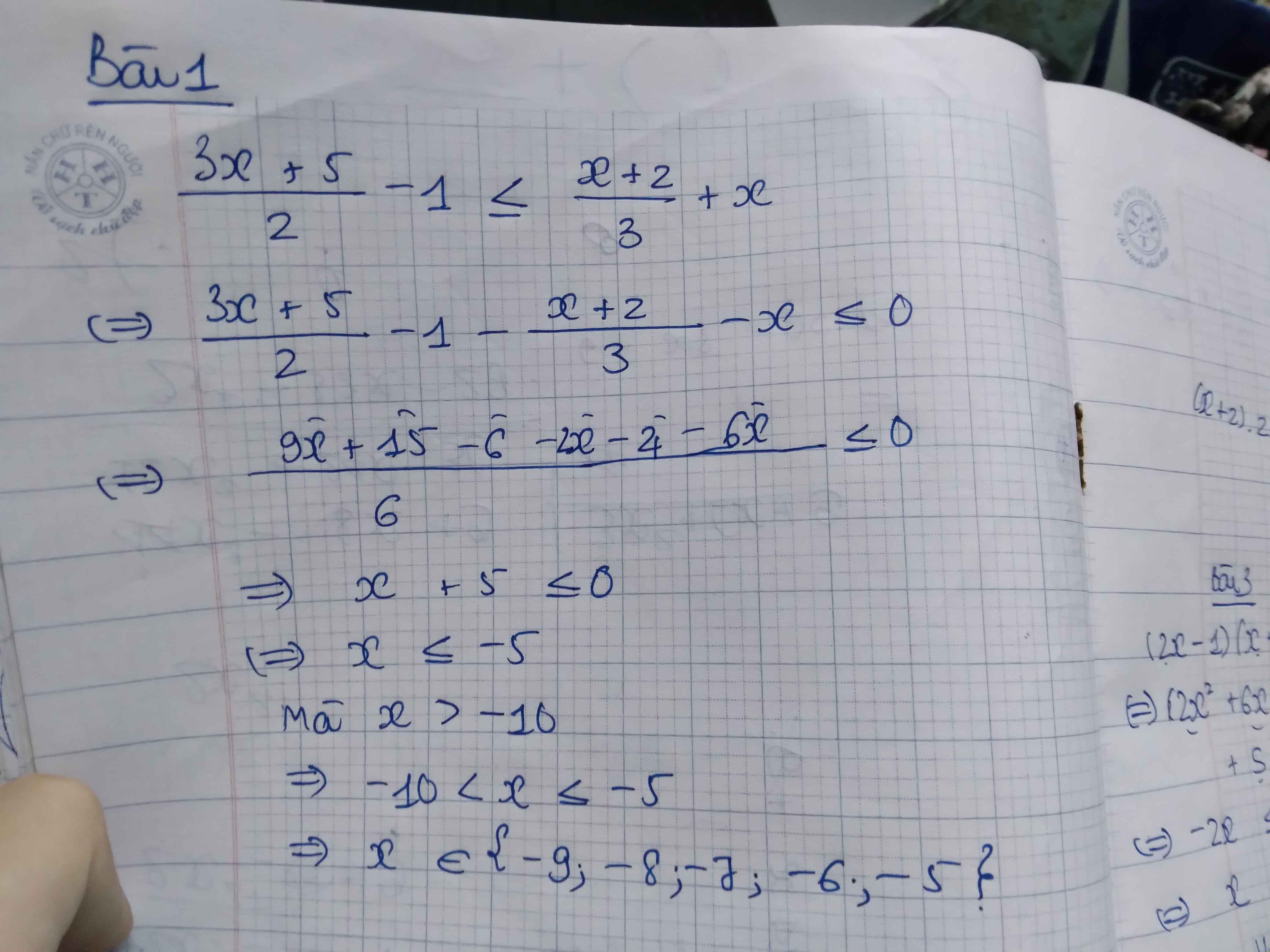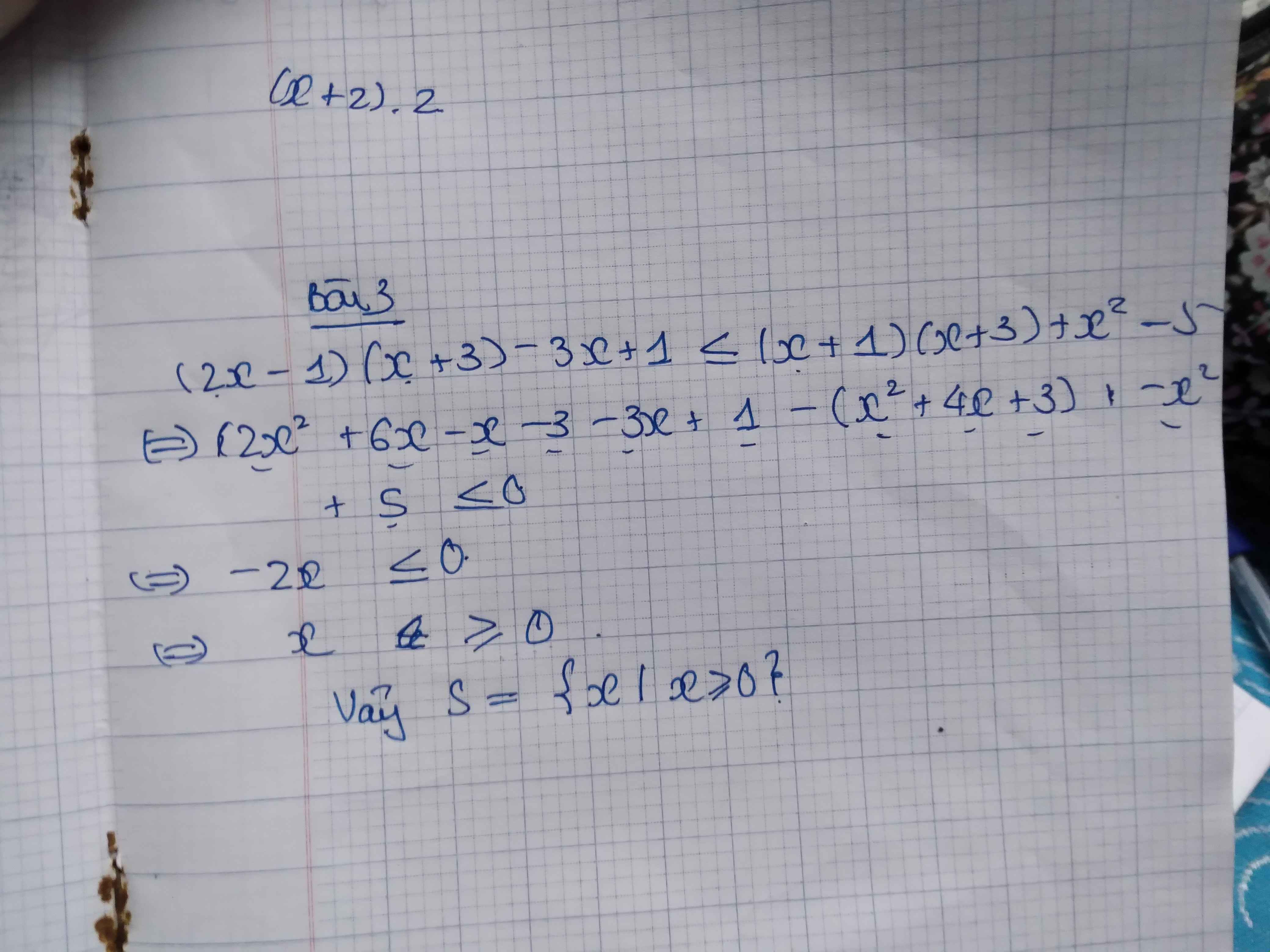tập nghiệm của bpt \(\left(\sqrt{3x-2}-1\right)\sqrt{x^2+1}< 0\)là

Những câu hỏi liên quan
1. Biết rằng tập nghiệm của bpt \(\sqrt{2x-4}-2\sqrt{2-x}\ge\dfrac{6x-4}{5\sqrt{x^2+1}}\) là \(\left[a;b\right]\) . Tính P=3a-2b
2. Tính tổng các giá trị nguyên dương của m để tập nghiệm của bpt \(\sqrt{\dfrac{m}{72}x^2+1}< \sqrt{x}\) có chứa đúng 2 số nguyên
1.
ĐKXĐ: \(x=2\)
Xét \(x=2\), bất phương trình vô nghiệm
\(\Rightarrow\) bất phương trình đã cho vô nghiệm
\(\Rightarrow\) Không tồn tại \(a,b\) thỏa mãn
Đề bài lỗi chăng.
Đúng 0
Bình luận (0)
Cho hàm số \(f\left(x\right)=\dfrac{x^2+x+\sqrt{x}}{x+1}\). Tìm tập nghiệm bpt \(f'\left(x\right)-1>0\)?
\(f\left(x\right)=x+\dfrac{\sqrt{x}}{x+1}\Rightarrow f'\left(x\right)=1+\dfrac{1-x}{2\sqrt{x}\left(x+1\right)^2}\)
\(f'\left(x\right)-1>0\Leftrightarrow\dfrac{1-x}{2\sqrt{x}\left(x+1\right)^2}>0\)
\(\Rightarrow0< x< 1\)
Đúng 1
Bình luận (0)
Cho bpt \(\sqrt{x^2-3x+m}>2x+1\) tìm m để bpt có nghiệm x ∈\(\left[0;2\right]\)
Khi \(x\ge0\Rightarrow2x+1>0\) nên BPT tương đương:
\(x^2-3x+m>\left(2x+1\right)^2\)
\(\Leftrightarrow x^2-3x+m>4x^2+4x+1\)
\(\Leftrightarrow3x^2+7x+1< m\)
Xét hàm \(f\left(x\right)=3x^2+7x+1\) trên \(\left[0;2\right]\)
\(-\dfrac{b}{2a}=-\dfrac{7}{6}\notin\left[0;2\right]\) ; \(f\left(0\right)=1\) ; \(f\left(2\right)=27\)
\(\Rightarrow f\left(x\right)\ge1\Rightarrow\) pt có nghiệm trên đoạn đã cho khi \(m>1\)
Đúng 1
Bình luận (0)
B1
\(\dfrac{3x+5}{2}-1\le\dfrac{x+2}{3}+x\)
Có bnhieu nghiệm nguyên lớn hơn -10
BÀI 2 . Tập nghiệm S của btp\(\left(1-\sqrt{2}\right)x< 3-2\sqrt{2}\)
BÀI 3 \(\left(2X-1\right)\left(x+3\right)-3x+1\le\left(x+1\right)\left(x+3\right)+x^2-5\) có tập nghiệm là?
Bài 1 :
Ta có : \(\dfrac{3x+5}{2}-1\le\dfrac{x+2}{3}+x\)
\(\Leftrightarrow\dfrac{3x+5}{2}-1-\dfrac{x+2}{3}-x\le0\)
\(\Leftrightarrow\dfrac{3\left(3x+5\right)-6-2\left(x+2\right)-6x}{6}\le0\)
\(\Leftrightarrow9x+15-6-2x-4-6x\le0\)
\(\Leftrightarrow x\le-5\)
Mà \(\left\{{}\begin{matrix}x\in Z\\x>-10\end{matrix}\right.\)
Vậy \(x\in\left\{-5;-6;-7;-8;-9\right\}\)
Đúng 2
Bình luận (0)
b3\(\Leftrightarrow2x^2+5x-3-3x+1\le x^2+2x-3+x^2-5\\ \Leftrightarrow0.x\le-6\Leftrightarrow x\in\varnothing\)
Đúng 0
Bình luận (0)
tìm tập nghiệm của bpt: \(\sqrt{2x+3}-\sqrt{x+1}>3x+2\sqrt{2x^2+5x-3}-16\) có nghiệm
Cho bpt \(-x^2-2\left(m-1\right)x+2m-1>0\) . Tìm tất cả các giá trị m để (0;1) là tập con của tập nghiệm bpt \(\left(x_1;x_2\right)\)
\(-x^2-2\left(m-1\right)x+2m-1>0\)
\(\Leftrightarrow x^2+2\left(m-1\right)x-2m+1< 0\)
\(f\left(x\right)=x^2+2\left(m-1\right)x-2m+1\)
Yêu cầu bài toán thỏa mãn khi \(f\left(x\right)=0\) có hai nghiệm phân biệt thỏa mãn \(x_1\le0< 1\le x_2\)
\(\Leftrightarrow\left\{{}\begin{matrix}\Delta'=\left(m-1\right)^2+2m-1>0\\f\left(1\right)\le0\\f\left(0\right)\le0\end{matrix}\right.\)
\(\Leftrightarrow\left\{{}\begin{matrix}m^2>0\\1+2\left(m-1\right)-2m+1\le0\\-2m+1\le0\end{matrix}\right.\)
\(\Leftrightarrow\left\{{}\begin{matrix}m\ne0\\m\ge\dfrac{1}{2}\end{matrix}\right.\)
\(\Leftrightarrow m\ge\dfrac{1}{2}\)
Đúng 0
Bình luận (0)
Tìm nghiệm của bpt
\(\frac{\left(\sqrt{x+1}-\sqrt{2x-1}\right)\left(\sqrt{x+1}-2\right)}{x-1}\le0\)
tính tổng các nghiệm thuộc [-5;5] của BPT:
\(\sqrt{x^2-9}\left(\frac{3x-1}{x+5}\right)\le x\sqrt{x^2-9}\)
ĐKXĐ: \(\left[{}\begin{matrix}x\ge3\\x\le-3\end{matrix}\right.\) ; \(x\ne-5\)
- Với \(x=\pm3\) thỏa mãn
- Với \(x\ne\pm3\)
\(\Leftrightarrow\frac{3x-1}{x+5}\le x\Leftrightarrow x-\frac{3x-1}{x+5}\ge0\)
\(\Leftrightarrow\frac{x^2+2x+1}{x+5}\ge0\Leftrightarrow\frac{\left(x+1\right)^2}{x+5}\ge0\)
\(\Rightarrow x>-5\)
Vậy nghiệm của BPT trên \(\left[-5;5\right]\) là: \(\left[{}\begin{matrix}-5< x\le-3\\3\le x\le5\end{matrix}\right.\)
Tính tổng nghiệm hay tổng nghiệm nguyên?
Tổng nghiệm là \(\sum x=5\)
Đúng 0
Bình luận (0)
Phương trình sqrt{2-fleft(xright)}fleft(xright) có tập nghiệm A {1;2;3}. Phương trình sqrt{2.gleft(xright)-1}+sqrt[3]{3.gleft(xright)-2}2.gleft(xright) có tập nghiệm là B {0;3;4;5} . Hỏi tập nghiệm của phương trình sqrt{fleft(xright)-1}+sqrt{gleft(xright)-1}+fleft(xright).gleft(xright)+1fleft(xright)+gleft(xright)
có bao nhiêu phần tử?
A.1
B.4
C.6
D.7
Đọc tiếp
Phương trình \(\sqrt{2-f\left(x\right)}=f\left(x\right)\) có tập nghiệm A = {1;2;3}. Phương trình \(\sqrt{2.g\left(x\right)-1}+\sqrt[3]{3.g\left(x\right)-2}=2.g\left(x\right)\) có tập nghiệm là B = {0;3;4;5} . Hỏi tập nghiệm của phương trình \(\sqrt{f\left(x\right)-1}+\sqrt{g\left(x\right)-1}+f\left(x\right).g\left(x\right)+1=f\left(x\right)+g\left(x\right)\)
có bao nhiêu phần tử?
A.1
B.4 C.6 D.7
\(\sqrt{2-f\left(x\right)}=f\left(x\right)\Leftrightarrow\left\{{}\begin{matrix}f\left(x\right)\ge0\\f^2\left(x\right)+f\left(x\right)-2=0\end{matrix}\right.\)
\(\Leftrightarrow\left\{{}\begin{matrix}f\left(x\right)=1\\f\left(x\right)=-2< 0\left(loại\right)\end{matrix}\right.\)
\(\Rightarrow f\left(1\right)=f\left(2\right)=f\left(3\right)=1\)
\(\sqrt{2g\left(x\right)-1}+\sqrt[3]{3g\left(x\right)-2}=2.g\left(x\right)\)
\(VT=1.\sqrt{2g\left(x\right)-1}+1.1\sqrt[3]{3g\left(x\right)-2}\)
\(VT\le\dfrac{1}{2}\left(1+2g\left(x\right)-1\right)+\dfrac{1}{3}\left(1+1+3g\left(x\right)-2\right)\)
\(\Leftrightarrow VT\le2g\left(x\right)\)
Dấu "=" xảy ra khi và chỉ khi \(g\left(x\right)=1\)
\(\Rightarrow g\left(0\right)=g\left(3\right)=g\left(4\right)=g\left(5\right)=1\)
Để các căn thức xác định \(\Rightarrow\left\{{}\begin{matrix}f\left(x\right)-1\ge0\\g\left(x\right)-1\ge0\end{matrix}\right.\)
Ta có:
\(\sqrt{f\left(x\right)-1}+\sqrt{g\left(x\right)-1}+f\left(x\right).g\left(x\right)-f\left(x\right)-g\left(x\right)+1=0\)
\(\Leftrightarrow\sqrt{f\left(x\right)-1}+\sqrt{g\left(x\right)-1}+\left[f\left(x\right)-1\right]\left[g\left(x\right)-1\right]=0\)
\(\Leftrightarrow\left\{{}\begin{matrix}f\left(x\right)=1\\g\left(x\right)=1\end{matrix}\right.\) \(\Leftrightarrow x=3\)
Vậy tập nghiệm của pt đã cho có đúng 1 phần tử
Đúng 0
Bình luận (0)



















